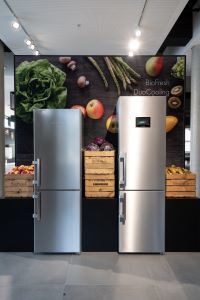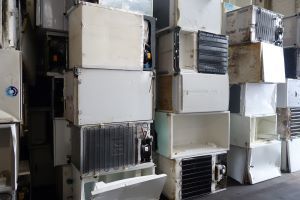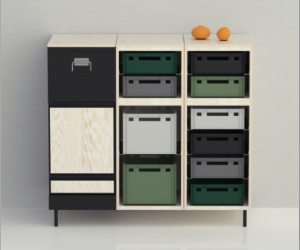A recyclable product design for refrigerators/freezers that is both energy and resource efficient is the main goal of Circular By Design. For this purpose, different scenarios are developed with the focus on repair and reuse as well as recycling paths that are as closed as possible. The combination of the resource efficiency analysis with a multi-regional extended input-output model should in future allow estimating product recyclability already at the design stage, thereby supporting a Design-for-Recycling optimization.

Recyclability
In order to ensure a stable supply of raw materials to the German economy in the future, rethinking the use of primary and secondary raw materials and life cycle-wide material flow management is urgently needed. In 2010, for example, only 14 percent of the raw materials used in Germany were obtained from scrap, with recycling costs of over 50 billion euros. For materials such as aluminium, steel or copper, which are found in many consumer goods, in 2016 the proportion of secondary raw materials was just 40 percent in total production in Germany. One of the main reasons for this is the fact that in the creation of new products (product design), the ability to recycle and recover materials at the end of their life cycle (EoL) has hardly been considered. This is where Circular by Design starts, using a refrigerator as an example of a household appliance to show what material efficiency potential exists with regard to the recovery of the raw materials contained in it, both in terms of product design and the selection of materials.

Laboratory for Design
The first-time combination of the resource efficiency analysis (process simulation of recycling processes at micro level) of the Helmholtz Institute Freiberg for Resource Technology and the multi-regional extended input-output model (WI-SEEGIOM, macro level) of the Wuppertal Institute for Climate, Environment and Energy should allow in future the prediction of a product design suitable for the recycling economy. This will be demonstrated using the example of one of the most frequently used and already well characterized consumer goods, the refrigerator/freezer, with participation of the manufacturer Liebherr-Hausgeräte. Under lead of the Folkwang University of the Arts (FUdK), the aim is to run through various scenarios within a living lab design process during the project period. Models are to be designed and simulated whose design allows almost complete recycling and reuse of individual components, thereby opening up new market and business models such as repair, cash-back, leasing, etc. With the cooperation of the project partners Becker Elektrorecycling (BEC) and Entsorgungsdienste Kreis Mittelsachsen (EKM) and based on the current reference product, which is particularly focussing on energy efficiency, it will be shown by quantifying the actual losses where the raw materials are lost, how these losses can be reduced by a suitable product design and how raw materials can be kept in circulation in the long term. In addition, the legal and practical feasibility of design concepts is discussed with industry experts.

Results (Status June 2022)
The publication on the cultural history of refrigeration has been created. With its help, it is possible to follow the steadily increasing complexity of the product "refrigerator/freezer" along a timeline. For example, at first there were no electronic components at all in the interior, but now there are up to six printed circuit boards that support the display or the ice crusher in their function. This development, in combination with the hardly removable connection types, makes it increasingly difficult to recycle the products at the end of the use phase and thus to obtain unmixed material flows. In order to be able to compare the product design of current and older refrigerators/freezers with regard to their friendliness for repair and recycling and to develop design options from this, an evaluation model is needed, at the end of which, among other things, there is a recycling index. The first version of such a model for the virtual recycling process was created. It includes both the physical initial treatment for refrigeration appliances (crushing and pre-sorting) and the further processing steps of the metallic material flows (metallurgical processing) and can be modelled by a process simulation if required. For further qualification of the model, detailed product and material information must be added in order to provide information on the recyclability, quantified by indicators for material recovery, environmental impact and resource consumption. Since such data are currently not available, individual devices were manually dissassembled in the laboratory and 100 units were dismantled and processed in a realistic large-scale test at STENA. The evaluation of these tests are currently in progress. What can already be stated, however, is that the friendliness of a product's disassembly is decisive for the possibility of repair as well as the quality of the recycling process.
Social benefit
A transferable design concept for the recycling of the materials used in consumer goods is expected to be developed using the example of a refrigerator/freezer prototype. If one takes a look at the proportion of steel, copper and aluminium, these together represent almost 60 percent of the weight of the refrigerator/freezer to be recycled, plus plastics with a weight share of around 35 percent. This corresponds to a material value of secondary raw materials of around 25 million euros per year, just for the produced tonnage of a refrigerator/ freezer producer. A savingpotential is assumed that can be achieved by reducing the amount of materials used, substituting non-sustainable materials such as PU foam or coolants, improving the collection of metallic waste and increasing the proportion of secondary raw materials in consumer goods.
Publications
Garcia Paz,F. A., Heibeck,M., Parvez, A. M., Torrubia, J., van den Boogaart, K. G., Raatz, S.:Recovery of Materials from Refrigerator: A Study Focused on Product Distribution, Recyclability and LCA Evaluation, sustainability 2024
Rubik, R., Nebel, K., Klusch, C., Karg, H., Hecht, K., Gerbig, M., Gartner, S., Boldrini, B.: Recovery of Materials from Refrigerator: A Study Focused on Product Distribution, Recyclability and LCA Evaluation", sustainability 2024
Final Report (short) (German, 2023)
The full report is available on request from the project coordinator PD Dr Simone Raatz.
F. Paz, M. Heibeck, A. Parvez, J. Torrubia, K.G. van den Boogaart, S. Raatz: Recovery of Materials from Refrigerator: A Study Focused on Product Distribution, Recyclability and LCA Evaluation, Sustainability 2024: https://doi.org/10.3390/su16031082
Project flyer of the funding measure (German / English) (March 2021)
The project flyers offer an insight into the contents and goals of the ReziProK projects and present first results in each case.
Project sheets of the funding measure (German) (August 2019)
The project sheets provide a brief overview of the individual projects and their goals.
Contributions to the ReziProK Transfer Conference in June 2022
Poster (German) (June 2022)
Presentation (German) (June 2022)
Picture Credits: Liebherr, FUdK
